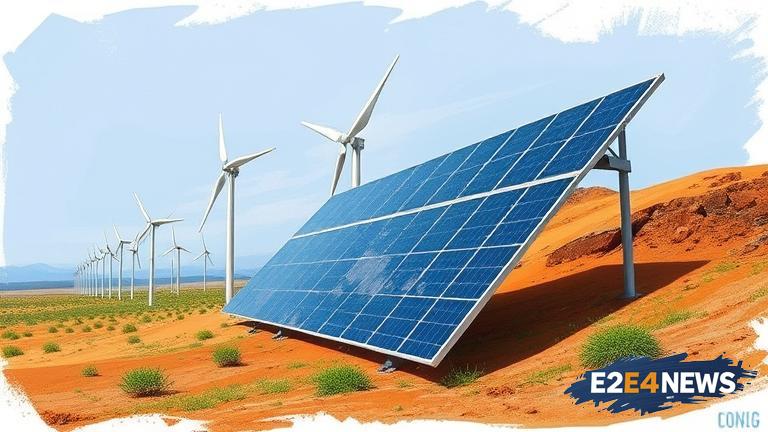The African continent is witnessing a significant shift towards renewable energy, driven by the need to address the pressing issues of energy access, climate change, and sustainable development. With a growing population and increasing economic activities, the demand for energy is on the rise, and renewable energy sources such as solar, wind, and hydroelectric power are becoming increasingly attractive. Many African countries are now investing heavily in renewable energy infrastructure, with a focus on solar and wind power. For instance, South Africa has set a target of generating 20% of its electricity from renewable sources by 2030, while Morocco aims to increase its renewable energy capacity to 52% of its total energy mix by 2030. Egypt, on the other hand, has launched several large-scale renewable energy projects, including a 1.8 GW solar park in the Aswan province. The use of renewable energy is not only helping to reduce greenhouse gas emissions but also creating new job opportunities and stimulating local economies. In addition, renewable energy is also improving energy access in rural areas, where many communities lack access to reliable and affordable energy. The African Union has also launched several initiatives to promote the development of renewable energy on the continent, including the African Renewable Energy Initiative, which aims to achieve at least 300 GW of renewable energy capacity by 2030. Furthermore, international organizations such as the International Renewable Energy Agency (IRENA) and the African Development Bank are providing technical and financial support to African countries to help them develop their renewable energy sectors. The private sector is also playing a crucial role in the development of renewable energy in Africa, with many companies investing in large-scale renewable energy projects. However, despite the progress made, there are still several challenges that need to be addressed, including the high upfront costs of renewable energy technologies, lack of infrastructure, and limited access to financing. To overcome these challenges, African countries need to develop policies and regulations that support the development of renewable energy, and also establish partnerships with international organizations and the private sector to access financing and technology. Moreover, there is a need to increase awareness and education about the benefits of renewable energy, and to build the capacity of local communities to develop and maintain renewable energy projects. In conclusion, the renewable energy revolution in Africa is gaining momentum, and with the right policies, investments, and partnerships, the continent can unlock its vast renewable energy potential and achieve a sustainable and prosperous future. The growth of renewable energy in Africa is also expected to have a positive impact on the environment, by reducing greenhouse gas emissions and mitigating climate change. Additionally, renewable energy can also improve energy security, by reducing dependence on imported fossil fuels and promoting energy self-sufficiency. The development of renewable energy in Africa is also expected to create new opportunities for economic growth and development, by stimulating local economies and creating new job opportunities. Overall, the future of renewable energy in Africa looks promising, and with continued investments and support, the continent can become a leader in the global transition to a low-carbon economy. The use of renewable energy is also expected to improve the health and wellbeing of communities, by reducing air pollution and promoting sustainable development. Furthermore, renewable energy can also help to promote energy access and equity, by providing energy to marginalized communities and promoting energy justice. In the long term, the development of renewable energy in Africa is expected to have a positive impact on the continent’s economic, social, and environmental development, and to contribute to the achievement of the United Nations’ Sustainable Development Goals (SDGs).





